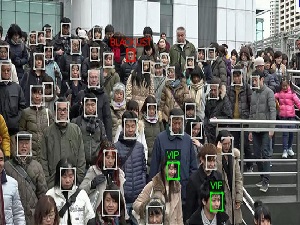



Date:08/08/18
 NEC has announced that it will provide a large-scale facial recognition system for the 2020 Summer Olympic and Paralympic Games in Tokyo. The system will be used to identify over 300,000 people at the games, including athletes, volunteers, media, and other staff. It’s the first time that facial recognition technology will be used for this purpose at an Olympic Games.
NEC has announced that it will provide a large-scale facial recognition system for the 2020 Summer Olympic and Paralympic Games in Tokyo. The system will be used to identify over 300,000 people at the games, including athletes, volunteers, media, and other staff. It’s the first time that facial recognition technology will be used for this purpose at an Olympic Games.
NEC’s system is built around an AI engine called NeoFace, which is part of the company’s overarching Bio-IDiom line of biometric authentication technology. The Tokyo 2020 implementation will involve linking photo data with an IC card to be carried by accredited people. NEC says that it has the world’s leading face recognition tech based on benchmark tests from the US’s National Institute of Standards and Technology.
Tokyo 2020 presents new security challenges that will require speedy identification. Unlike many previous games, Tokyo 2020 won’t have a single Olympic park where people can move freely between several venues and facilities; instead, events will be spread out across the metropolitan area, and people will need to authenticate themselves at each.
NEC and the organizers’ goal is for the facial recognition system to speed this process up as much as possible. The dangers associated with long wait times in oppressive summer heat are also a concern. The games get underway on July 24th, 2020, and if temperatures match what Japan has experienced in the past couple of weeks, it’ll be the hottest Olympics in more than a century.
NEC demonstrated the technology in Tokyo today, showing how athletes and other staff wouldn’t be able to enter venues if they were holding someone else’s IC card. The company even brought out a six-foot-eight former Olympic volleyball player to demonstrate that the system would work with people of all heights, though he certainly had to stoop a bit. It worked smoothly with multiple people moving through it quickly; the screen displayed the IC card holder’s photo almost immediately after.
NEC has robust experience in this field, but as familiarity with face recognition technology grows worldwide, Tokyo 2020 could be its highest-profile test yet.
NEC unveils facial recognition system for 2020 Tokyo Olympics
 NEC has announced that it will provide a large-scale facial recognition system for the 2020 Summer Olympic and Paralympic Games in Tokyo. The system will be used to identify over 300,000 people at the games, including athletes, volunteers, media, and other staff. It’s the first time that facial recognition technology will be used for this purpose at an Olympic Games.
NEC has announced that it will provide a large-scale facial recognition system for the 2020 Summer Olympic and Paralympic Games in Tokyo. The system will be used to identify over 300,000 people at the games, including athletes, volunteers, media, and other staff. It’s the first time that facial recognition technology will be used for this purpose at an Olympic Games.NEC’s system is built around an AI engine called NeoFace, which is part of the company’s overarching Bio-IDiom line of biometric authentication technology. The Tokyo 2020 implementation will involve linking photo data with an IC card to be carried by accredited people. NEC says that it has the world’s leading face recognition tech based on benchmark tests from the US’s National Institute of Standards and Technology.
Tokyo 2020 presents new security challenges that will require speedy identification. Unlike many previous games, Tokyo 2020 won’t have a single Olympic park where people can move freely between several venues and facilities; instead, events will be spread out across the metropolitan area, and people will need to authenticate themselves at each.
NEC and the organizers’ goal is for the facial recognition system to speed this process up as much as possible. The dangers associated with long wait times in oppressive summer heat are also a concern. The games get underway on July 24th, 2020, and if temperatures match what Japan has experienced in the past couple of weeks, it’ll be the hottest Olympics in more than a century.
NEC demonstrated the technology in Tokyo today, showing how athletes and other staff wouldn’t be able to enter venues if they were holding someone else’s IC card. The company even brought out a six-foot-eight former Olympic volleyball player to demonstrate that the system would work with people of all heights, though he certainly had to stoop a bit. It worked smoothly with multiple people moving through it quickly; the screen displayed the IC card holder’s photo almost immediately after.
NEC has robust experience in this field, but as familiarity with face recognition technology grows worldwide, Tokyo 2020 could be its highest-profile test yet.
Views: 762
©ictnews.az. All rights reserved.Similar news
- The mobile sector continues its lead
- Facebook counted 600 million active users
- Cell phone testing laboratory is planned to be built in Azerbaijan
- Tablets and riders outfitted quickly with 3G/4G modems
- The number of digital TV channels will double to 24 units
- Tax proposal in China gets massive online feedback
- Malaysia to implement biometric system at all entry points
- Korea to build Green Technology Centre
- Cisco Poised to Help China Keep an Eye on Its Citizens
- 3G speed in Azerbaijan is higher than in UK
- Government of Canada Announces Investment in Green Innovation for Canada
- Electric cars in Azerbaijan
- Dominican Republic Govt Issues Cashless Benefits
- Spain raises €1.65bn from spectrum auction
- Camden Council boosts mobile security





















